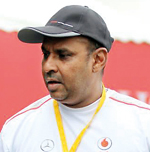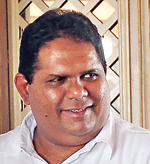Is it that ‘Bonza’ has cleared the first hurdle!
View(s):
Asanga Seneviratne
The Western Province Rugby Football Union (WPRFU), the power in local rugby has outvoted the incumbent President Asanga Seneviratne. The Sunday Times learns that 14 votes were in favour of the Vice President Lasitha Gunaratne while only four voted for Seneviratne. Sources involved in the voting believe that only one Division ‘A’ Club voted for Seneviratne. Unconfirmed sources opined that only Police SC from the Division ‘A’ clubs voted against Gunaratne.
This tells a big story on what the fraternity thinks of the man who claims to have brought in sponsors and also pushed the game to a better position. With WPRFU being the power house in the present voting structure of Sri Lanka Rugby (SLR) there is no way the advent of Gunaratne being crowned as President being excluded. Unless and then of course the defeated seek a court ruling which is being buzzed. Former Secretary Rizly Ilyas won approval with none against to clinch nomination for the new post of Deputy President which will be the line of succession.
The aspersions cast on the current President, who has been around either as President or in the council for six years is a lesson for those taking office as development has to be real and not for some.

Lasitha Gunaratne
Regrettably the Treasurer, who has to play a vital role in governance, has received the nod to be in office again. In today’s world of governance much is expected from this position and one hopes with his background he will live up to the expectation of the stakeholders.
Thusitha Peiris, who made an exit from the WPRFU has been voted to the pivotal post of Secretary. A man known as a doer and not a nodder of assent will do well to guide Sri Lanka rugby and not be guided as his reputation goes. The nomination of Michael Jayasekera, whose name was proposed by the Seneviratne camp, was not accepted as he had informed that he had not given his consent. The mystery of the nomination without consent needs a re-look as it was recently that his name was chopped off from the selection committee nominations that was sent to the Ministry without a signature.
Nazim Mohammed taking over as Vice President and General Liyanage, Niranjan Abeywardena and Jeevan Goonetilke being new faces joining the returning Fazal Mohammed and retained Roshan Deen and Shamrath Fernando.
What was the position, the interest and or the need that prompted majority of clubs in the WPRFU to back away from supporting the incumbent President Asanga Seneviratne. It is understood that three of the seven clubs at the top end of club rugby took a neutral stance in nomination but two voted from the house. The nomination by WPRFU of Vice President Lasitha Gunaratne to lead rugby for the future puts him in an unassailable position.
Why did the constituent clubs of the province voted against Seneviratne, who is credited of having brought sponsors. Yet most feel that clubs have been neglected. There is also a cry that there was too much money committed to full time staff at the expense of the clubs. The claim of no support exposes to an dichotomy of a situation as the bigger clubs have not supported but the lesser known have voted for Seneviratne.
For some reason or another the challenge has been brewed from within as well as by those who have been serving on the side of the former President. The disappointment is for many reasons. Chief among them is the ask of what has happened to Sri Lanka Rugby other than for spending. It is bordering on a joke when the CEO announces that we will not reach the levels we were ten years ago. A damning statement on a President who has held office or have been involved for over five years in various capacities.
Stakeholders feel that the period was long enough and a change is needed. Then it appeared that there are clubs who are perturbed with the attitude of paid staff on whom much is paid. The high performance coach has irked some and there is one major player in the clubs whose toes the high performance coach has trampled on says those who are engineered the ouster.
Some say attitude is a secondary issue and the bench-marking should be against performance. The distracters say statistics prove otherwise and world over the job of high performance is not passed onto someday based only on rugby experiences. Why did some, who have joined the bandwagon of the joint opposition for rugby, stay so long to say the performance does not merit further consideration. Why wait all this time and close to an election to ask about the qualifications and or suitability is the question I asked. The answer was that just because we did not do it does not mean that we should continue to support. Better late than never!
There is also a question about not playing of the 15-a-side game and pulling out of the Asian Series. I would say play more 7s but do not neglect the 15s. The argument is real from the view point of many players in the forces and if Police SC are included there are four teams out of eight. For them the award and possession of a national cap is more than a personal pride.
 It is about the future as they get recognition for donning national colours when it comes to promotions. Some say this is playing with the life of many while pandering to feed may be three or four. A former President of the SLR opined that it was ludicrous to say that 7s and 15s clash and there is impediment for progress. He said it is all about structure. His question was as to how many players leave School in an year. Why not pool them in clubs and have specific 7s squads while playing the 15s.
It is about the future as they get recognition for donning national colours when it comes to promotions. Some say this is playing with the life of many while pandering to feed may be three or four. A former President of the SLR opined that it was ludicrous to say that 7s and 15s clash and there is impediment for progress. He said it is all about structure. His question was as to how many players leave School in an year. Why not pool them in clubs and have specific 7s squads while playing the 15s.
Why not play a round 7s spread over a given number of weeks before a 15-a-side. He went onto say that if there is a will there is a way. The question is that there are no funds as people in this council think. An experienced coach was of the view that the funding can come by cutting the top heavy expenditure. If you save Rs. 500,000 a month; that could pay the players on a monthly winner system for 7s played before a 15-a-side match. This may also boost attendance and also attract other sponsors without trying to see ways and means of taking control, of school rugby. Another suggested that this money could be used to develop Provincial 7s squads.
It might be worth reading contents or at least watch the video on ‘the invisible Gorilla’. This experiment reveals two things: that we are missing a lot of what goes on around us, and that we have no idea that we are missing so much. It is one of the best-known experiments in psychology. It is described in most introductory textbooks and is featured in more than a dozen science museums. That is the problem as explained in invisible Gorilla is about selective attention. Probably this is what caused the Asanga Seneviratne showdown.
Vimal Perera is a former Rugby Referee, Coach and an Accredited Referees’ Evaluator IRB


